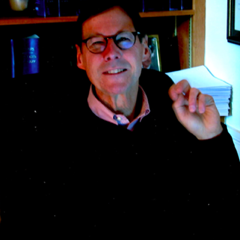Wednesday, Dec 13 | An invitation from the incarnate
December 13, 2017 | Stan Johnson
 Editor's Note
Editor's Note
Mystery | 1 Corinthians 1:23-25
When I was a child – and when I relive that childhood – Christmas-time was wondrous albeit veiled with mystery. Without question, the lights, the scents, the foods, and the wrapped presents were a wonder; but equally, and somehow touching if not eluding these was the sense that something secretive, something mysterious was present, or soon to be present. Was it in the air? Was it a look? Was it a hug – or perhaps the clear, crisp, night sky? What was it – what is it?
Within the New Testament, the Greek word μυστήριον, becomes for us in English a near-transliteration: mystery; and this Greek word can mean: “(God’s) secret”, or “that which transcends normal understanding, transcendent/ultimate reality”.[1] Furthermore, this word occurs twenty-five times within the New Testament, but almost exclusively within the Pauline corpus, for instance in 1Corinthians 2:1-2 where Paul wrote:
When I came to you, brothers and sisters, I did not come proclaiming the mystery of God to you in lofty words or wisdom. For I decided to know nothing among you except Jesus Christ, and him crucified.
Surely Christ crucified – the Son of God crucified (and yes, risen) – “transcends normal understanding”, and yet it is fully consistent with Paul’s thought, which precedes these two verses; for he had just written of an apparently topsy-turvy, transcendent world:
[We] proclaim Christ crucified, a stumbling block to Jews and foolishness to Gentiles, but to those who are the called, both Jews and Greeks, Christ the power of God and the wisdom of God. For God's foolishness is wiser than human wisdom, and God's weakness is stronger than human strength. (1 Corinthians 1:23-25)
For Paul, Christ crucified is foolishness to Greek, Western, logically philosophical minds – and yet it transcends such minds: there is something more, something beyond; for Paul, Christ crucified is morally repugnant to Jewish, Eastern, moral thought and action – and yet it transcends these. Paul did not shy away from mystery: the Gospel was/is not irrational, neither is it ethically bankrupt; rather it transcends any and all human constructs, those that are philosophical and those that are religious.
This transcendence Dietrich Bonhoeffer captured well when he wrote:
“No priest, no theologian stood at the cradle in Bethlehem. And yet all Christian theology has its origin in the wonder of all wonders, that God became [human] . . . Theologia sacra arises from those on bended knees who do homage to the mystery of the divine child in the stall … Without the holy night there is no theology.”[2]
Without question, if Jesus Christ is not the Crucified and Risen One, then we would know nothing of Advent and Christmas; but because he is, then wonder of wonders, as Bonhoeffer suggested, the Incarnation invites us into the mystery of God, neither to resolve nor to define it, but with praise to thrill with wonder. This Advent, may it be so for you and me.
Activity
Bundle warmly, and then stand quietly for ten minutes beneath a December, night sky (hopefully a clear, star-studded night). As you stand, ponder afresh: perhaps on such a night, God-Incarnate entered into our world – and remains, inviting us into His world, transcending thought and experience. And as you stand, share your wonder with him (even if your teeth chatter and your fingers grow numb).
Prayer
Gracious Lord,
This Advent and Christmas, may we thrill with wonder and delight – not with all the sights and sounds and scents, which abound, but instead, as your Children, may we enter your Kingdom via a stable door. In you may we find the “mystery of the Kingdom of God”; in you may we find the only real and transcendent wisdom and righteousness, which makes of any other cheap tinsel. In you may we behold the Christmas glory of your Cross.
Humbly we ask in your Name.
Amen.
[1] A Greek-English Lexicon of the New Testament and other Early Christian Literature, (Chicago: The University of Chicago Press, 2000) pp. 661-662.
[2] Dietrich Bonhoeffer, A Testament to Freedom, eds. Geffrey B. Kelly and F. Burton Nelson, (New York: Harper-Collins Publishers, 1995), p. 448.